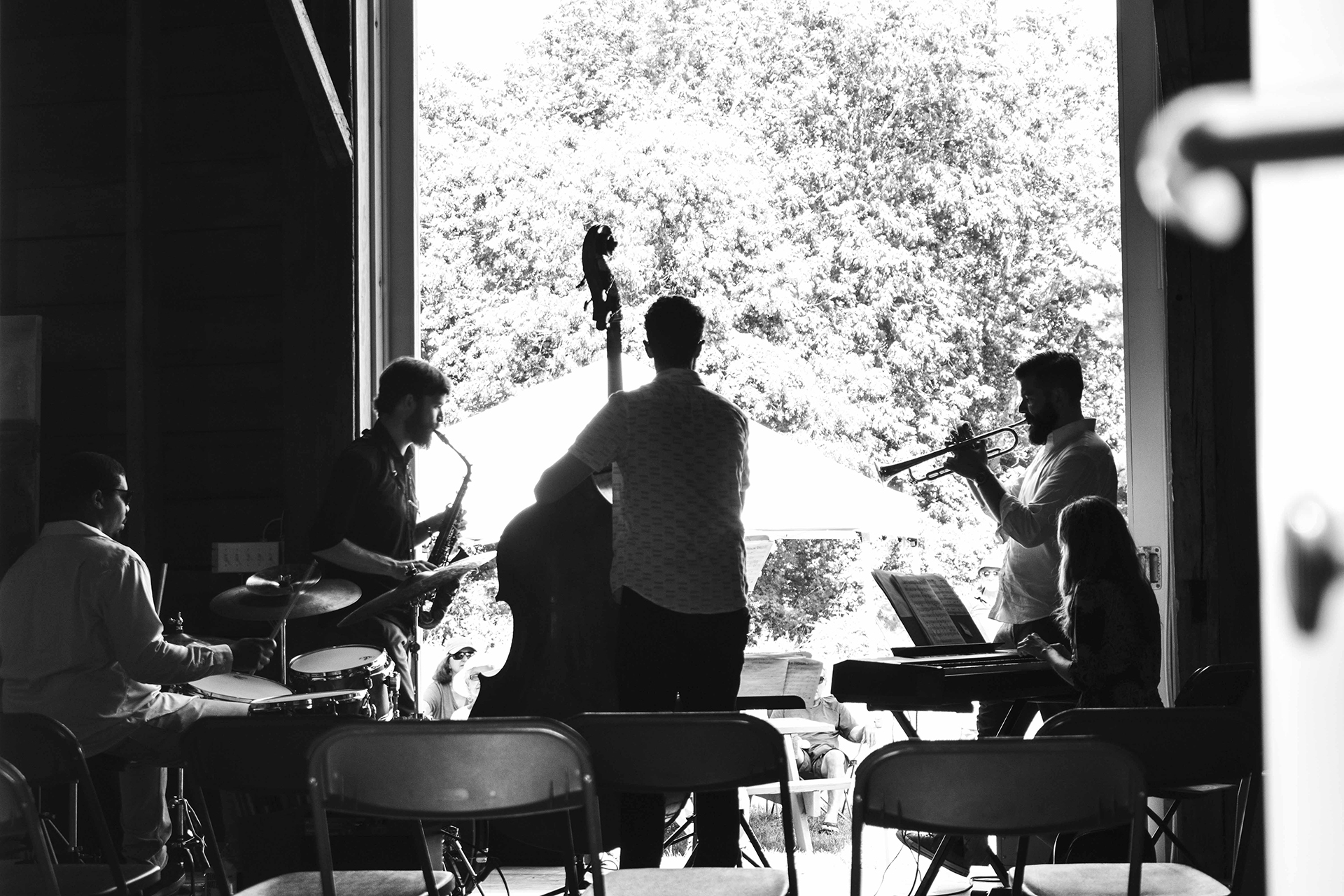The American Songbook, Reimagined

“The space is amazing acoustically” with a “festival-esque feel, like we were at a stage at the Newport Festival in 1958,” said Peter Watrous of the East End’s coolest new arts venue. He means the beautiful restored old Duck Creek barn off Three Mile Harbor Road in Springs. In its inaugural year, it’s been serving as a show place for visual arts and music events, none, arguably, more welcome than the late-July and upcoming early-September weekend jazz sessions.
Programmed by Watrous, a musician who studied and played jazz in New Orleans for a while, and whose writing creds include extensive work for The Nation, The Village Voice, and The New York Times, the September sessions at the Arts Center at Duck Creek will feature Watrous’s quartet doing standard and “reimagined” takes on the American Songbook, traditional blues, and progressive.
The July sessions brought out a crowd, most of which sat on the lawn outside the barn and reveled in the performances. Even the dogs that accompanied their wine-toting owners were appreciatively quiet. As Watrous said, it was “a real treat to be able to bring out some of New York’s best young musicians and be able to present them for free, and have it be casual enough so people in the audience felt comfortable enough to come up and spend time with the musicians after the shows.”
Jazz, America’s unique contribution to the world of music, has always been a genre that demands expertise. Many of the greats exhibit classical training that anchors and informs even their most experimental and innovative riffs. You can’t fake it in jazz.
Watrous’s connection with Duck Creek began when he worked with Jess Frost, the center’s executive director, when she ran the Silas Marder Gallery a few years ago, and he programmed music events there and performed with his trio.
Despite cuts in arts funding, Watrous believes that there’s a “literate and intelligent” audience on the East End waiting for more high-quality jazz, though he concedes that summer may be a difficult time to advance such initiatives because of the competition for people’s attention. Still, the line-up is, as he said, “particularly strong,” considering the personnel.
Leading off Friday, September 6, veteran bassist, composer, band leader, and music educator David Ambrosio and his group will swing in the late 1960s, much of the music from the Blue Note Era, memorialized as “Civil Disobedience,” an “artistic response” to the politics of that iconic time. As Watrous notes, the music is “highly complex but beautiful,” recalling Jackie McClean, Bobby Hutcherson, McCoy Tyner, and others. As for the performers, they couldn’t be more top-notch — Montauk’s own Bill O’Connell on piano, Abraham Burton on sax, Duane Eubanks on trumpet.
On Saturday, September 7, it’s Watrous on guitar with Shenel Johns’s voice joining Jacob Sacks on piano, Ambrosio on bass, and Allan Mednard on drums. They’ll be moving out “Standards Deconstructed,” assembling and disassembling familiar American Songbook material (“How Deep is the Ocean,” “Long Ago and Far Away”), the tunes “more pliable, opening them up to different types of modern improvisation,” making “the old sound contemporary,” Watrous said. So, no humming, please. Don’t even try (you wouldn’t be able to keep up, anyway). But do stay for the Q&A.
On Sunday, September 8, the musicians crescendo into “Riff Tunes, Bigger, Louder, Faster,” a percussion-led exploration of the 1930s and ’40s featuring the compositions of Count Basie, Charlie Christian, Thelonious Monk, Lester Young, Duke Ellington, and Harry “Sweets” Edison. Chet Doxas on sax, Sacks on piano, Ambrosio on bass, Mednard on drums.
It’s all happening in the Arts Center at Duck Creek. Originally an 18th- Century homestead that included a farmhouse belonging to the Edwards family (original settlers of the Maidstone Colony), East Hampton township purchased the site in 2006, and with the generous support of the Willem de Kooning Foundation, the HILO Foundation, and a growing number of local supporters, it became a free, open-to-the-public not-for-profit corporation licensed by the town. Duck Creek’s mission is to “perpetuate the goals and the spirit of artist John Little,” the late abstraction expressionist and fabric designer who purchased a parcel of the original farm in 1948.
The center is open between May 1 and October 31.
Reservations are a must for limited indoor seating. Outdoor seating is free. It’s located at 127 Squaw Road, East Hampton. Email duckcreekarts@gmail.com for more info. Each show will offer two 45-minute sets from 5 to 7 PM. Bring a chair, a blanket, nibbles, drink, and get set to get down with some spectacular sound.



